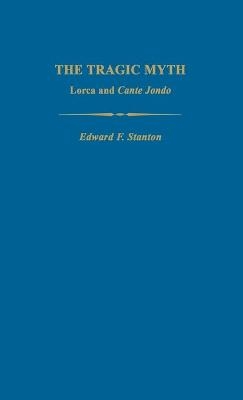
The Tragic Myth
Lorca and Cante Jondo
Seiten
1978
The University Press of Kentucky (Verlag)
978-0-8131-1378-4 (ISBN)
The University Press of Kentucky (Verlag)
978-0-8131-1378-4 (ISBN)
- Keine Verlagsinformationen verfügbar
- Artikel merken
With literature, music constituted the most important activity of poet and playwright Federico Garcia Lorca's life. Stanton examines Lorca's theoretical and practical approach to cante jondo, the traditional music of Andalusia, as seen in his lectures on the subject and in the 1922 concurso.
With literature, music constituted the most important activity of poet and playwright Federico Garcia Lorca's life. The two arts were closely related to each other throughout his career. As a child, Lorca imbibed traditional Andalusian songs from the lips of the family maids, whom he would remember with affection years later. At a very early age he began to study piano, and during his adolescence, music and poetry competed for primacy among his interests. His first book was dedicated to his music teacher, who instilled in him a love for the world of art and creation.
In part I of this study, Edward F. Stanton examines Lorca's theoretical and practical approach to cante jondo, the traditional music of Andalusia, as seen in his lectures on the subject and in the 1922 concurso. In part II, he searches for direct and -- far more important -- indirect echoes of this music in his work. Part III explores the mythic quality of Lorca's art in relation to cante jondo. Throughout, Stanton illuminates a new dimension of the poet's work.
With literature, music constituted the most important activity of poet and playwright Federico Garcia Lorca's life. The two arts were closely related to each other throughout his career. As a child, Lorca imbibed traditional Andalusian songs from the lips of the family maids, whom he would remember with affection years later. At a very early age he began to study piano, and during his adolescence, music and poetry competed for primacy among his interests. His first book was dedicated to his music teacher, who instilled in him a love for the world of art and creation.
In part I of this study, Edward F. Stanton examines Lorca's theoretical and practical approach to cante jondo, the traditional music of Andalusia, as seen in his lectures on the subject and in the 1922 concurso. In part II, he searches for direct and -- far more important -- indirect echoes of this music in his work. Part III explores the mythic quality of Lorca's art in relation to cante jondo. Throughout, Stanton illuminates a new dimension of the poet's work.
Edward F. Stanton is a professor of Spanish at the University of Kentucky and the author of Hemingway and Spain and other books on various aspects of Hispanic life.
| Reihe/Serie | Studies in Romance Languages |
|---|---|
| Verlagsort | Lexington |
| Sprache | englisch |
| Themenwelt | Geisteswissenschaften ► Sprach- / Literaturwissenschaft ► Anglistik / Amerikanistik |
| Geisteswissenschaften ► Sprach- / Literaturwissenschaft ► Literaturwissenschaft | |
| ISBN-10 | 0-8131-1378-4 / 0813113784 |
| ISBN-13 | 978-0-8131-1378-4 / 9780813113784 |
| Zustand | Neuware |
| Haben Sie eine Frage zum Produkt? |
Mehr entdecken
aus dem Bereich
aus dem Bereich
Poetik eines sozialen Urteils
Buch | Hardcover (2023)
De Gruyter (Verlag)
59,95 €
Buch | Softcover (2024)
belleville (Verlag)
20,00 €


